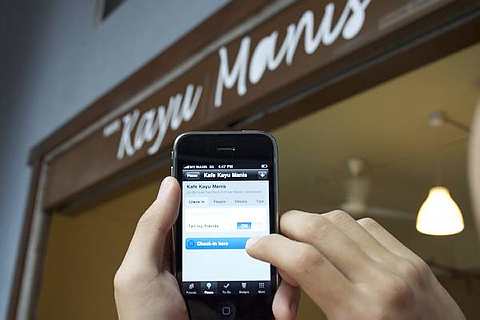LAST week, some of you might have managed to check in onto Facebook Places via your iPhone (BlackBerry users were already able to do this a few months back).
The feature has finally arrived in Malaysia – although there are some people complaining that they are still unable to check in via iPhones and Android phones (unless, you’re using Facebook Zero, which lets you log on to Facebook for free).
Malaysians are no strangers to geo-location applications. As of December last year, over 20,000 Malaysians are already actively logging on to applications such as Foursquare, which allows users to check in from their respective locations. Gowalla does the same as well.
Depending on which Twitter client you use, you may also have tagged your Tweet with your location. Photo-sharing network Instagr.am allows you to use Foursquare to tag your images.
There are many more, of course, and now Facebook – with 9.5 million users as of last month (according to greyreview.com) – has joined in the fray.
As usual, the regular questions about privacy issues have popped up. But I wonder if it is time to stop complaining about these issues, considering how much we ourselves choose to share on our social network pages?
I am often asked about the negative elementsdownside of being so connected. For most people, these are privacy and safety issues.
The favourite examples are websites like Pleaserobme.com, which aggregated a list of “empty homes” based on information on social networks.
The site claims to have stopped providing the service, stating: “We are satisfied with the attention we’ve gotten for an issue that we deeply care about. We’re not showing the Twitter messages anymore, as they no longer add anything. If you don’t want your information to show up everywhere, don’t over-share ;-).”
Rather than providing a service to robbers, the creators of the site created it to prove a point, which is not to “over share” a sentiment with which I concur.
You are the holder of any information concerning your life, and therefore you choose what goes out there and what doesn’t.
But that is simplistic as there are so many other factors involved.
Last year, Facebook founder Mark Zuckerberg created a storm by implying that the “age of privacy” is a thing of the past. He was responding to a question about Facebook’s step at the time to open up of personal information – all provided by the user themselves, mind you – of its users on the social network.
Critics felt that blaming the evolution of what is private and what is not was simply an excuse for Facebook to open up such information. Rather, they feel that it is such actions by Facebook that has become the catalyst for such an evolution.
In many ways, I agree with the critics but I cannot disagree with Zuckerberg as well. The fact is that hundreds of millions of people has chosen to share such information with a man (or company) they do not know. We have placed so much trust on this person, his company and his network to keep our information safe.
We continue to carry on our lives, sharing online and not worrying too much about the consequences. This is not wrong, though, as there are many benefits to social media.
But Zuckerberg is right – privacy has evolved.
However, it never hurts to err on the side of caution. It is important to remember that what hasn’t changed is the fact that we remain the keepers of our information (to a large extent).
So we need to choose how we negotiate our activities – not just online but offline. If you don’t want people to know that you smoke, then don’t get caught smoking in public.
There are, of course, a few things you can do. Being conscious of over-sharing is one. I would also recommend you start reading. If terms and conditions are too complicated for you (it is for me!), then spend some time researching expert sites.
Every time there are new privacy setting changes on social networks, there are usually many articles on the Internet with directions on how you can adjust your settings to protect yourself.
It is important to note that most social networks have privacy settings which you can (learn to) adjust.
You can also make it hard for people to track you down by being inconsistent, or vague. If you don’t routinely check in the same places for example, it is hard for anyone to find a pattern.
Then, there is also the matter of whom you are adding to your network. As in your real life where you are selective of whom you befriend, take the same caution online as well. If you are going to invite a stranger into your network, you need to know that he or she will have access to information about yourself.
At the end of the day, you decide for yourself what is private and what is not. But I suppose it never hurts to be careful.


Tell us what you think!